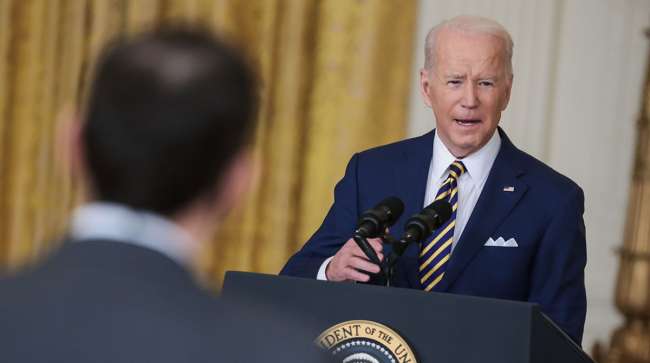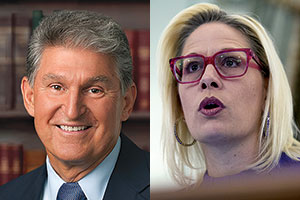Senior Reporter
Biden, Congressional Dems to Calibrate Build Back Better Act

[Stay on top of transportation news: Get TTNews in your inbox.]
Legislative components of a nearly $2 trillion U.S. House-passed social infrastructure budget likely will be considered separately in Congress over the coming weeks, President Joe Biden said Jan. 19.
Acknowledging his Build Back Better Act’s comprehensive list of climate change and social safety net provisions, as well as the overall price tag that lacked sufficient support on Capitol Hill, Biden said he would consider a trimmed down version of the bill.
The legislation is stuck in the U.S. Senate after it had garnered partisan backing in the U.S. House of Representatives last year.
“We’re going to have to probably break it up. I think that we can get — and I’ve been talking to a number of my colleagues on the Hill — I think it’s clear that we would be able to get support for the $500 billion-plus for energy and the environmental issues that are there,” Biden told reporters at the White House during a press conference marking his first year in office.
Democratic leaders in the Senate aimed to advance the package via a budgetary process requiring a simple majority for passage. The chamber is split 50-50, and Republicans pledged their opposition to the budget measure.

Joe Manchin (D-W.Va.), Krysten Sinema (D-Ariz.)
However, a chief hurdle for advancing the Build Back Better Act was opposition primarily within the Democratic caucus. Sens. Joe Manchin of West Virginia and Kyrsten Sinema of Arizona consistently raised concerns about the package’s potential impact on inflation and proposals to the federal tax code.
“I know that the two people who’ve opposed, on the Democratic side at least, support a number of the things that are in there,”Biden said. “For example, [Sen.] Joe Manchin strongly supports early education, three and four years of age. Strongly supports that. There is strong support for, I think, a number of the ways in which to pay … for this proposal.

Host Seth Clevenger, fresh from CES, discusses autonomous and electric trucks with Joe Adams of Kenworth and Cheng Lu of TuSimple. Hear a snippet above, and get the full program by going to RoadSigns.TTNews.com.
“So, I think there is, and I’m not going to negotiate against myself as to what should and shouldn’t be in it, but I think we can break the package up, get as much as we can now, and come back and fight for the rest later.”
Senior members of the Democratic caucus insist they agree with the White House on splintering the Build Back Better Act to advance the bill’s components prior to the midterm elections this year.
“The most recent version of it is not going to happen, but if you look at the core of the bill, I think the core is education and workforce and things like reduced child care and education expenses, workforce training and then support for the workforce in areas like health care,” Sen. Tim Kaine (D-Va.) said on CBS’ “Face the Nation” on Jan. 16. “There are other pieces of the bill that are more controversial. I still believe we’re going to find a core of this bill, whatever we call it, we’re going to find the core of the bill and pass it, and it will deal directly with some of these inflation concerns.”
I still believe we’re going to find a core of this bill … and it will deal directly with some of these inflation concerns.
Sen. Tim Kaine (D-Va.)
On transportation policy, the House-passed Build Back Better Act would approve $600 million for Maritime Administration projects meant to alleviate congestion at ports. For the U.S. Department of Transportation, $300 million would be provided for the development and application of low-emission aviation programs. The National Highway Traffic Safety Administration would receive nearly $50 million to promote equity in traffic enforcement.
Want more news? Listen to today's daily briefing above or go here for more info
The Build Back Better Act is billed as the second-half of Biden’s legislative agenda. In November, he enacted into law the first part of his agenda in the form of a $1 trillion package titled the Infrastructure Investment and Jobs Act.
Separate from policy proposals, congressional leaders are tasked in the near-term with approving funding legislation that would avert a shutdown at most federal agencies. Funding authority for the government expires Feb. 18, and appropriations leaders have expressed optimism about resolving disagreements ahead of the deadline.
In a recent joint statement, Rep. Rosa DeLauro (D-Conn.) and Sen. Patrick Leahy (D-Vt.), chairpersons of the House and Senate Appropriations committees, respectively, said, “We look forward to further conversations in the coming days, with the shared goal of finishing our work by the Feb. 18 government funding deadline.”





